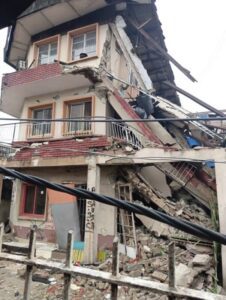
Is PVC still the best tool for democracy?
The debate surrounding the fate of unclaimed Permanent Voters’ Cards (PVCs) in Nigeria has recently gained attention, particularly following a report suggesting that the Independent National Electoral Commission (INEC) might consider destroying over six million uncollected cards. However, INEC has swiftly debunked this claim, asserting that no such policy is under consideration.
While this may quell immediate concerns, the broader issues raised by this debate deserve further reflection, especially as they touch on the integrity of the electoral process, voter participation, and the relevance of PVCs as the sole means of identification for voting.
One of the issues highlighted by this report is the persistence of low voter turnout and the reluctance of many Nigerians to collect their PVCs, despite the high levels of registration.
According to INEC’s data, 87.2 million PVCs were collected for the 2023 election, while about 6.2 million remained unclaimed. While this figure represents only a small percentage of the total voter base, the sheer number of uncollected PVCs raises several questions about the efficiency of the current system and the reasons behind voters’ apathy.
Is this reluctance to collect PVCs a result of mistrust in the electoral process or simply a reflection of disinterest in participating in what many perceive as a flawed system?
In tackling these concerns, it is essential to ask whether the current policy of retaining unclaimed PVCs indefinitely is sustainable or if a more efficient and cost-effective system could be established.
The enormous costs associated with printing and maintaining millions of PVCs must be carefully examined. Should the Electoral Act be amended to set a definitive timeline for retaining unclaimed PVCs before they are archived or discarded? After all, other legislative frameworks, such as the Companies and Allied Matters Act (CAMA), already provide timelines for record retention.
Similarly, the huge taxpayer resources invested in the production and distribution of PVCs must be considered in any potential policy change. Destroying these cards without giving citizens ample opportunity to collect them may also breach data protection laws, as the sensitive personal information contained in these cards should not be disposed of hastily.
Moreover, the existing practice of making PVCs the sole voting instrument in Nigeria raises questions about its relevance in a rapidly evolving technological landscape. In many countries, including the United States and the United Kingdom, voting is not exclusively tied to a specific card. Alternative forms of identification, such as national ID cards, driver’s licenses, or passports, are often acceptable. Nigeria’s National Identity Management Commission (NIMC) already stores biometric data, and the Federal Road Safety Corps (FRSC) and other agencies maintain similar records.
This suggests that there may be a viable alternative to the PVC, which could potentially simplify the voting process and increase voter turnout.
Should INEC consider accepting other forms of identification, such as national ID cards, driver’s licenses, and international passports, as valid for voting? Doing so would not only reduce the financial burden on the electoral body but could also make voting more accessible to a larger segment of the population, including young Nigerians who may not have had the opportunity to register for a PVC. This could also address the issue of voters who find the PVC registration and collection process too cumbersome or stressful.
Furthermore, opening up the possibility for citizens to vote using various forms of identification would likely increase participation and reduce the number of disenfranchised voters. Equally important is INEC’s role in fostering transparency and credibility in the electoral process. The more Nigerians trust the system, the more likely they are to engage with it.
If INEC is to successfully combat voter apathy, it must demonstrate consistency and transparency in its operations, including the timely and verifiable electronic transmission of results. A robust and credible election process will inspire public confidence and encourage active participation.
The issue of unclaimed PVCs also brings into focus broader concerns about Nigeria’s electoral system. The low rates of participation observed in recent elections, where only a fraction of eligible voters cast their ballots, point to systemic challenges that go beyond the logistics of voter card distribution. These challenges must be addressed if Nigeria is to achieve its long-term goal of free, fair, and inclusive elections.
As INEC contemplates the future of voter registration and card collection, it must ensure that the process is streamlined, inclusive, and accessible to all Nigerians. Ultimately, the central question remains: is the PVC system still the most effective means of ensuring a legitimate election process in Nigeria? While the PVC has served its purpose in the past, it may be time to reconsider the role it plays in modern elections.
A multi-faceted approach to voter identification, alongside enhanced transparency and public trust, could pave the way for a more inclusive, efficient, and credible electoral system. While the debate over PVCs may seem like a minor logistical issue, it reflects larger concerns about voter participation, trust in the electoral process, and the efficient use of public resources.
As Nigeria strives for greater electoral credibility, it is essential to explore new ways to improve the system, engage citizens, and ensure that no eligible voter is left behind. INEC must innovate and evolve in order to build an electoral framework that truly serves the people.




